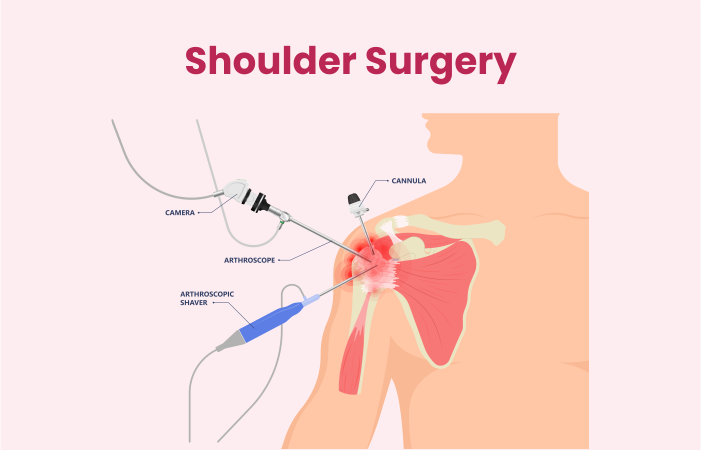Shoulder Surgery in Hyderabad

Shoulder Surgery
Welcome to TX Hospitals, the leading destination for comprehensive shoulder care and specialized shoulder surgeries in Hyderabad. If you are experiencing shoulder pain or have been diagnosed with a shoulder condition that requires surgical intervention, you’ve come to the right place. Our team of highly skilled orthopedic surgeons specializes in shoulder surgeries, including arthroscopic procedures, shoulder replacements, and rotator cuff repairs. In this article, we will provide you with valuable information about shoulder surgery, including its purpose, why it is performed, how to prepare for the procedure, and the consequences of delaying necessary shoulder surgery.

What is Shoulder Surgery?
Shoulder surgery refers to a range of surgical procedures performed to treat various shoulder conditions and injuries. It involves accessing the shoulder joint and surrounding structures to repair damage, alleviate pain, and improve function. Common types of shoulder surgery include shoulder replacement, arthroscopic procedures, rotator cuff repairs, and ligament repairs.
Why is Shoulder Surgery Performed?
Shoulder surgery is performed for several reasons, including:
- Relieving pain: Shoulder surgery aims to alleviate chronic shoulder pain caused by conditions such as rotator cuff tears, shoulder impingement, or arthritis.
- Restoring function: Shoulder surgeries are often performed to restore proper shoulder function, allowing individuals to regain strength, range of motion, and stability in the shoulder joint.
- Repairing injuries: In cases of acute injuries, such as shoulder dislocations or ligament tears, surgery may be necessary to repair the damaged structures and prevent further complications.
How to Prepare for Shoulder Surgery?
Preparing for shoulder surgery involves several important steps to ensure a safe and successful procedure. Here are some key aspects of the preparation process:
- Consultation and evaluation: You will have a consultation with a shoulder specialist at TX Hospitals who will evaluate your condition, review your medical history, and discuss your symptoms. They will explain the surgical options available and answer any questions you may have.
- Pre-operative testing: Your healthcare team will perform pre-operative tests, such as imaging scans and blood tests, to assess your overall health and ensure that you are fit for surgery.
- Medication and lifestyle adjustments: Your surgeon will provide specific instructions regarding any necessary medication adjustments, fasting guidelines, or lifestyle changes leading up to the surgery. It is important to follow these instructions closely for a successful procedure.
More About Shoulder Surgery at TX Hospitals
At TX Hospitals, we take pride in our team of highly experienced orthopedic surgeons specializing in shoulder surgeries. Our surgeons are renowned for their expertise in performing arthroscopic shoulder procedures, shoulder replacements, rotator cuff repairs, and other advanced techniques. We prioritize patient safety and comfort, utilizing state-of-the-art technology and adhering to the highest standards of care.
Consequences of Delaying Shoulder Surgery
Delaying necessary shoulder surgery can have several consequences, including:
- Increased pain and discomfort: Delaying surgery can result in continued shoulder pain, decreased mobility, and limitations in daily activities, affecting your quality of life.
- Worsening of the condition: Many shoulder conditions, such as rotator cuff tears or shoulder dislocations, can worsen over time if left untreated. This can lead to further damage to the shoulder joint and potentially more complex surgical interventions in the future.
- Functional limitations: Without timely treatment, shoulder conditions can lead to functional limitations, making it difficult to perform simple tasks or engage in physical activities. Don’t delay seeking the treatment you need. Contact us at TX Hospitals to schedule a consultation with our esteemed shoulder surgeons. We are committed to providing you with the highest quality care and guiding you towards optimal shoulder health and functionality. Learn more about shoulder surgery and experience the best outcomes at TX Hospitals, the trusted destination for shoulder care in Hyderabad.
Frequently Asked Questions (FAQs)
The recovery time can vary depending on the type and complexity of the shoulder surgery performed. In general, it may take several weeks to months to fully recover. Your surgeon will provide you with specific post-operative instructions and a rehabilitation plan to help you regain strength and function gradually.
Like any surgical procedure, shoulder surgery carries some risks and potential complications. These can include infection, bleeding, blood clots, nerve injury, stiffness, and persistent pain. However, your surgeon will take measures to minimize these risks, and they will discuss potential complications with you before the surgery.
Yes, physical therapy is an essential part of the recovery process after shoulder surgery. It helps improve range of motion, strength, and stability in the shoulder joint. Your surgeon will prescribe a personalized rehabilitation program that may include exercises, stretches, and manual therapy to aid in your recovery.
Initially, you may experience some limitations in your daily activities following shoulder surgery. However, as you progress through your rehabilitation program and recover, you should regain functionality and be able to resume most of your regular activities. Your surgeon will guide you on activity restrictions and gradually increase your activity level as you heal.
The longevity of the results depends on various factors, including the specific condition treated, the surgical technique used, and how well you follow post-operative care and rehabilitation. In some cases, shoulder surgery can provide long-lasting relief and improved function. However, it is important to maintain a healthy lifestyle and follow your surgeon’s recommendations to optimize the longevity of the results.
Most shoulder surgeries are performed using minimally invasive techniques, resulting in smaller incisions and less noticeable scars. Your surgeon will make every effort to minimize scarring, and they may provide instructions on scar care and techniques to help reduce their appearance.
The majority of shoulder surgeries are performed under general anesthesia, which means you will be asleep and feel no pain during the procedure. In some cases, regional anesthesia or a combination of regional and general anesthesia may be used. Your anesthesiologist and surgeon will determine the most appropriate anesthesia approach for your specific surgery.









